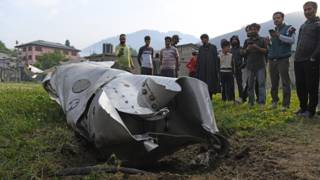
Topics
As India and Pakistan draw closer to the brink of nuclear war, President Bush and Russian President Vladmir Putin have signed a nuclear arms treaty that they are hailing as the official end of the cold war era.
But does the treaty really reduce the threat of nuclear war? It doesn’t require either side to destroy a single missile launcher or warhead. It allows them to keep weapons in storage where they can be reactivated on short notice.
The agreement is also expected to pave the way for Bush’s unilateral withdrawal from the 1972 Anti-Ballistic Missile treaty, so he can build a “star wars” global missile system.
The treaty’s only real constraint is that each side must have no more than 2,200 warheads by the year 2012. But that’s when the treaty expires. And both sides have far more strategic nuclear warheads than they need. The Pentagon itself called for reducing its active warheads to that number in its own classified strategy documents.
Meanwhile, Putin joined President Bush and leaders of the 18 other NATO nations in adopting a Rome Declaration at a heavily-guarded Italian air force base outside Rome on Tuesday.
The declaration establishes a NATO-Russia joint council in which Moscow will have an equal voice in taking common decisions on military issues, terrorism, and arms proliferation.
NATO Secretary General George Robertson said “there is a common enemy out there” that needs to be defeated by “leaders of the democratic world.”
We’re joined right now by Jacqueline Cabasso, who is the executive director of the Western States Legal Foundation and the co-author of a recent report, “The Shape of Things to Come: The Nuclear Posture Review, Missile Defense, and the Dangers of a New Arms Race.”
Guest:
- Jacqueline Cabasso, executive director of the Western States Legal Foundation. She coauthored the recent report “The Shape of Things to Come: The Nuclear Posture Review, Missile Defense, and the Dangers of a New Arms Race.”
Related link:











Media Options